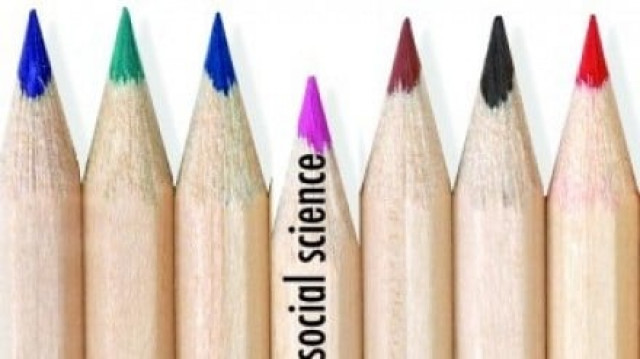The rest is history

The rest is history
For the past 63 years, we have defined History as Pakistan Studies and Philosophy as Islamiyat. As a result, we lack not only the skill of self-criticism but also suffer from a crisis of identity and civic belonging. In 2009, we lost two of Pakistan’s great historians, K. K. Aziz and A.H. Dani who represented an ever-dwindling number of trained professionals with the requisite critical and linguistic skills to investigate history. It isn’t simply that their legacies are not cherished, but that there do not seem to be any institutional mechanisms through which new historians and new social-scientists can emerge.
This endemic lag is itself encapsulated within the greater failures of educational institutions in the last three decades. Take my own case. At the age of 19, my parents sent me abroad for higher education. We were sent in our hundreds, perhaps hundreds of thousands, perhaps more, to become doctors, engineers, and later, IT specialists, economists, managers. There are no figures or any concrete data about this lost generation of Pakistanis which stretch from the late 1980s to 2001. Anecdotally speaking, not that many of us returned. Not only am I an emigrant, I am also the son and grandson of emigrants.
My grandfather migrated from the other side of Punjab and my father was among the first few to embark for the Gulf States in the early 1970s attracted by the high salaries for his engineering skills. Those petro-riyals would secure his children’s future through higher education. His dream begotten was formed from hardened disappointment concerning the state of higher education in Pakistan a sense of crisis that has not left us. The Punjab University, the F.C. College, the Government College of the late 1980s were political ghettos dividing the (then, outlawed) student movements into chaotic camps. My FSc and BSc classes were little more than roll-call gatherings.
My Mathematics professor, my Physics professor, my Statistics professor urged us to sign up for their respective tuition centres and purchase their respective study guides. My parents, who had personally known every single teacher I ever had, met with each of these professors. They paid them the money required and eagerly deposited me at the tuition centers. I learned how to deconstruct the final paper, before I learned a single bit of differential equation. In the meanwhile, my mother kept a prayer vigil to keep me safe from the campus violence. I was sent abroad because, in the eyes of my parents, they had no choice.
The upward mobility of the middle class demanded a hard science professional degree and such things were not easy to come by in 1991. So, they did what they thought they must and packed off their son to distant shores. In spirit, this was not remarkable considering the long history of knowledge migrants who had been crisscrossing Asia and Africa since the thirteenth century. In reality, this was entirely new representing a telling lack for a struggling postcolonial state to secure its own middle class. Have things changed in the two decades since? The tuition centres of early 90s are now colleges giving out their own diplomas.
The colleges are now universities haggling for foreign credentials. Every neighbourhood has their own choice of B.B.A, C.P.A, M.B.A, C.S. degree mills stuffed into bare-cement multi-storied buildings with classrooms bleeding into each other and, outside, an impromptu parking station overflowing with cars and motorcycles. There appear to be many choices for any student, all private, all secure. The tyranny of high marks in Metric or FScseems to have disappeared. Private universities like L.U.M.S., Ghulam Ishaq, Mehran etc. purport to give you an international education (at international rates) in your own backyard.
Science, Engineering and Medicine attract even foreign students to Pakistan (though this nation reels everyday from the work of an earlier generation of imported students). However, this proliferation of universities, most with glowingly rendered international connections, a world-class faculty and incredible fees cannot be taken as a sign of progress. In September 2009, Nature magazine published a comprehensive review, authored by noted social scientists, of Pakistan’s higher education reforms since 2002. It noted some stark realities underpinning the supposed abundance: Chronic underfunding of higher education was just one of the challenges identified. Other concerns were a lack of political will for meaningful reform, a lack of appreciation for the role education can play in development, ineffective governance systems, political interference in university administration, weak institutional leadership and, at the university level, a lack of performance culture and accountability.
Concomitant critiques from the likes of Pervez Hoodbhoy articulated greater chasms between the goals of reform and their results; the faculty were startlingly being segregated between haves and have-nots, the research was sub-par and the curriculum lacked rigor. Less readily apparent in both the abundance of for-profit universities and in their collective shortcomings is the lack of a liberal education in any of these curriculums. As a historian, I believe, rather fundamentally, that a liberal education, one that foregrounds critical inquiry, investigations into the human condition and a multiplicity of views is the cornerstone of any open, democratic, civic-minded and liberal society.
I believe that the health of any civil society rests upon a perceived consensus on human rights, human dignity, and dialogue and discourse. These are all qualities that are only nourished through placing a cultural and societal emphasis on a broad liberal education. While we have a number of institutions engaged in Fine Arts, there is no bastion of liberal education in Pakistan. There is no space for the Engineering or Medical student to learn how to think, to ask the Big Question, to participate in the life of the mind. But there is no greater need, at this juncture, than the need for critical humanistic scholarship.



















COMMENTS
Comments are moderated and generally will be posted if they are on-topic and not abusive.
For more information, please see our Comments FAQ